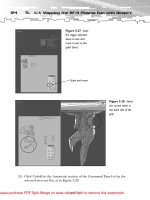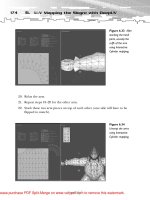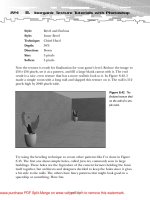Tài liệu Health promotion and health education for adults pdf
Bạn đang xem bản rút gọn của tài liệu. Xem và tải ngay bản đầy đủ của tài liệu tại đây (112.34 KB, 15 trang )
A series of 29 booklets
documenting workshops
held at the Fifth
International Conference
on Adult Education
6b
Health education for adults
Health promotion and health education for adults
This publication has been produced by the UNESCO Institute for Education within
the context of the follow-up to the Fifth International Conference on Adult Education
(CONFINTEA V), held in Hamburg in 1997.
Readers are reminded that the points of view, selection of facts, and the opinions
expressed in the booklets are those that were raised by panellists, speakers and par-
ticipants during the workshop sessions and therefore do not necessarily coincide with
official positions of the UNESCO or of the UNESCO Institute for Education Hamburg.
The designations employed and the presentation of the material in this publication do
not imply the expression of any opinion whatsoever on the part of the UNESCO
Secretariat concerning the legal status of any country or territory, or its authorities,
or concerning the delimitations of the frontiers of any country or territory.
Theme 6: Adult learning in the context of environment,
health and population
Booklets under this theme:
6a Adult environmental education: awareness and
environmental action
6b Health promotion and health education for adults
6c Adult education and population issues in the post-Cairo context
UNESCO Institute for Education Tel.: (+49 40) 44 80 41-0
Feldbrunnenstrasse 58 Fax: (+49 40) 410 77 23
D-20148 Hamburg
Germany e-mail:
homepage: />ISBN 928201089-9
Design by Matthew Partridge, Hamburg
Printed by Druckerei Seemann, Hamburg
1999
1
F o re w o rd
In July 1997 the Fifth International Conference on Adult Education was
held in Hamburg, organised by UNESCO and in particular the UNESCO
Institute for Education, the agency’s specialist centre on adult learning
policy and research. Approximately 1500 delegates attended from all
regions of the world, with representatives of 140 member states and
some 400 NGOs. In addition to the work of the commissions and plenary
which debated the official documents of the Conference The Hamburg
Declaration and The Agenda for the Future, there were 33 workshops
organised around the themes and sub-themes of the Conference.
As part of its CONFINTEA follow-up strategy, the UNESCO Institute
for Education has produced this series of 29 booklets based on the pre-
sentations and discussions held during the Conference. The recordings
of all the workshops were transcribed and synthesized over one year,
edited, and then formatted and designed. A tremendous amount of work
has gone into this process. Linda King, coordinator of the monitoring
and information strategy for CONFINTEA, was responsible for oversee-
ing the whole process. Madhu Singh, senior research specialist at UIE,
undertook the mammoth task of writing almost all the booklets based
on an analysis of the sessions. She was helped in the later stages by
Gonzalo Retamal, Uta Papen and Linda King. Christopher McIntosh was
technical editor, Matthew Partridge designed the layout and Janna
Lowrey was both transcriber and translator.
The booklets are intended to draw out the central issues and con-
cerns of each of the CONFINTEA workshops. They are the memory of
an event that marked an important watershed in the field of adult learn-
ing. We hope that they will be of use both to those who were able to
attend CONFINTEA V and those who were not. We look forward to your
comments, feedback and continuing collaboration with the UNESCO
Institute for Education.
Paul Bélanger,
Director, UNESCO Institute for Education, Hamburg
and Secretary General of CONFINTEA
Health promotion
and health education
for adults
I n t ro d u c t i o n
Health has always been an important topic in adult education. It features
in the curriculum of many adult education as well as general education
programmes. Health-related education projects offer courses on general
health, nutrition, healthy lifestyle, as well as on specific diseases and
their treatment.
Improving people’s knowledge about health is a major component in
m a n yl i t e r a c ya n db a s i ce d u c a t i o np r o g r a m m e s .M a n y of thesep r o g r a m m e s
focus on women and include nutrition, hygiene and family planning.
Health education is often combined with other measures to improve
well-being and promote community development. Such programmes
usually include micro-credits or skills training for income-generating
activities. In addition to the structured learning opportunities in formal
institutions, adults also learn about health in local self-help and com-
munity groups, at the workplace or in non-formal organisations. They
also receive information about health informally from television or adver-
tising, or from their parents and peers.
Education is a major determinant of health. It is well known that
those who are most likely to suffer from ill health are not only the
poorest, but also those with the lowest level of education. What is more,
experience in both developing and developed countries shows that
literacy and non-formal education programmes can lead to signific a n t
improvements in health and general well-being.
Although there have always been close links between health education
and adult education, the relationship between the two has not always
3
been systematic. Recently, however, the two fields have been drawn
more closely together. The concept of health education, which now
embraces a wider notion of health promotion and a new emphasis on
prevention, is increasingly focused on learning and empowerment. New
methods of teaching in health education have gained ground in accord-
ance with concepts of learning in adult education. Within adult educa-
tion, the major changes reflect the recognition that adult education has
high relevance to current societal issues. As a consequence, adult edu-
cation is encompassing more and more factors and is increasingly taking
a central role among diverse policy sectors – health being one of them.
As a result of these changes, new strategies have been developed in
areas where health and adult education overlap. As new connections are
forged, the need for a systematic approach to collaboration between the
sectors is felt. The growing importance of health in adult learning and
the interest in joint action is reflected by the fact that health education
and health promotion were included for the first time in a UNESCO con-
ference on adult education. The workshop clearly underlined the desire
from both sides for greater co-operation.
The workshop, chaired by Mercedes Juarez, Royal Tropical Institute,
Netherlands, featured the following speakers: Ilona Kickbusch, Division
of Health Education and Promotion, WHO; Kris Heggenhougen from the
Harvard Medical School, Chij Shrestha, World Education, Nepal; Gerlinde
Zorzi, Volkshochschule Hamburg, Germany.
The context
Since the Alma-Ata Declaration on Primary Health Care (1978) and the
Ottawa Charter for Health Promotion (Ottawa 1986), which identifie d
the essential role of health education, substantial progress has been
made in improving global health. Infectious diseases and infant mor-
tality have declined. More people are better nourished. Access to clean
water has increased and people are living longer than before.
But these gains have not been evenly spread. They have been accom-
panied by major setbacks for many sections of the population. The
majority of the world’s population still lives in poverty, with poor housing
and sanitary conditions. Many people still have no access to basic health
care. Despite progress in controlling certain diseases, many contagious
diseases, such as malaria, are on the increase. At the same time new
4
epidemic diseases have emerged. There are vast inequalities in access
to treatment of certain diseases, with drastic consequences for people
with HIV/Aids in particular. In industrialised countries, increases in non-
communicable diseases, such as cancer, as well as increases in chronic
health problems, stress and drug abuse, have slowed progress towards
the goal of “health for all”. Developing countries are also experiencing
an increase in lifestyle-related health problems, on top of their already
high incidence of infectious diseases. Lifestyle-related diseases are
responsible for 70-80% of deaths in developed countries and for about
40% in the developing world.
This situation not only demands sustained investment in public health
infrastructure, but also necessitates new approaches to prevention and
health promotion, these include providing access to health information,
encouraging participation in the control of health measures, and sup-
porting communities in the development of their own health systems.
All these strategies rely heavily on adult learning.
H o w e v e r, despite the urgent need to develop such strategies and to
continue the struggle for “health for all”, there is an unwillingness to
invest in public health infrastructure, basic health prevention services
and education. In industrialised countries, health budgets are being cut
s i g n i fi cantly and health systems are becoming increasingly privatised,
making access to health care more difficult for large sections of the
population. In developing countries, the economic crises, structural
adjustment programmes and a reduction of foreign aid have negatively
affected health and education services.
The social aspects of health
“Health is essentially a social construct: it is created in the interaction
between people and their environments in the process of everyday life:
where people live, love, learn, work and play.”
Ilona Kickbusch, Promoting Health Through Adult Learning.
CONFINTEA, Hamburg, 1997
What is defined as health or sickness, as well-being or disease, depends
not only on individual and biological factors, but on the social and cul-
tural environment within which we live, work and interact. Different
cultures and sub-cultures have their own understanding of health and
5
sickness. Western biomedical science, although dominating much of
diagnostic and therapeutic practice in many parts of the world, is not
the only way to fight disease. Health education needs to take into account
such different concepts and recognise different medical traditions and
local ways of healing. To d a y, much adult education in the area of health
emerges from a growing awareness of the limitations of allopathic medi-
cine and an interest in alternative medicine. People no longer uncritically
accept the dominance of one model and the role of the medical expert as
the only provider of knowledge. Increasingly, they ask for information
on specific diseases and want to be informed about different therapeutic
options.
If health is a social construct and a social process, medical factors
alone cannot explain what makes us sick or how we can be cured. The
physical and social environment within which we live is equally, if not
more, important. Basic requirements include access to clean water, hous-
ing and food. Other factors, such as economic resources, social situation
and political participation are equally important.
It follows from the above that health problems cannot be solved by
medical intervention or behavioural change alone. It is crucial that health
education take into account the social, environmental and economic
factors that determine people’s health. Health education needs to enable
people to change these conditions. In this view, health education is
essentially a social and political process, and a central component of
human development.
Health promotion
The concept of health promotion builds on a social and cultural under-
standing of health and illness. Health promotion is the process of enabling
people to increase control over their health through advocacy and inter-
sectoral action. Health promotion is a dynamic and evolving concept
which involves people in the context of their everyday lives, e.g. home,
school, workplace, etc., and promotes the achievement of the highest
level of physical, mental and social well-being for all.
Health education can be understood as a component of health pro-
motion. Health promotion and health education both aim at improving
access to health-related information and services to give people more
control over their own health and well-being. The knowledge referred
6
to here deals not only with the dissemination of simple health facts, but
also other information and skills, such as negotiation and coping skills.
A key component of health promotion policies is community action.
Local initiatives are supported through the provision of relevant know-
ledge, information and training. Recognising the role of environmental
and social factors in achieving and maintaining health, community
initiative often takes the form of advocacy or political action for creating
an environment conducive to health. Such initiatives focus attention
not only on models of disease or curative services, but on the social and
institutional factors in everyday life.
Although community action implies that communities take on respon-
sibility for their own health, this does not mean that attention is directed
away from the political level and the professional health sector. Advocacy
and lobbying for better health and more effective health policies is a
major objective of health promotion. Public health education is the
government’s responsibility.
Health education and adult learn i n g
Adult learning plays an important role in current health promotion stra-
tegies. At the same time adult educators increasingly recognise the
importance of health, including environmental health. There is growing
interest among adults to learn more about health issues and this trend
is reflected in the growing number of programmes offered in this area.
The closeness between these fields is reflected in the similarity of
goals and principles which characterise both contemporary adult educa-
tion and health promotion policies. Both are being developed to empower
people and encompass individual and societal change.
Just as adult education is a process of enabling people to improve
their own living conditions and general welfare, including health status,
so also is health education/promotion a process of enabling people to
take control over their health.
Community participation and learner involvement are shared prin-
ciples of health education and adult education. Both health educators
and adult educators are aware of the importance of the community
setting its own agenda. It is considered extremely important to build on
local initiatives and people’s own experience, e.g. by involving local
health specialists and community committees. The role of the health
7
educator or the adult educator is to be a facilitator, a resource, a catalyst
for action and sometimes a link for communities to approach other struc-
tures, such as government services.
Recent developments in both health and adult learning have brought
the two sectors closer together. In the area of health, major changes in
policy have been seen since the end of the 70s. The Primary Health Care
(PHC) strategy based on the integration of social and economic develop-
ment, requires community involvement and emphasises people’s own
capacity to make decisions and manage their health problems. In a
similar way, adult education in the 70s and 80s developed towards its
current focus on participatory learning which starts with people’s own
knowledge and experience, and puts control of learning into their own
hands. Increased recognition of different forms of knowledge, including
‘alternative’ or local forms of healing, and a shift away from the expert or
the teacher as the only provider of information, have a strong influ e n c e
on teaching practice in both fields, health and adult education.
In the health sector, the change in the concept of health education
and the emergence of the new health promotion strategy has been the
most important development in adult learning. Health education has
moved from a sole emphasis on transfer of information and individual
life-style changes to health promotion that focuses more on the social,
economic and environmental factors which are conducive to healthy
lifestyles and self-reliance.
With the emergence of this new social understanding of health, adult
learning has become increasingly important in health policies. Health
professionals and health educators today acknowledge the relevance and
usefulness of the methods and strategies developed by the adult educa-
tion profession.
Health as a basic human right
Like education, health is a basic human right. It is also a prerequisite
for the full enjoyment of all other human rights. Respecting this prin-
ciple requires that national and international human rights instruments
be adopted and applied.
8
Health literacy
“Health literacy” implies confidence in making one’s own decisions
relating to health. Health literacy includes knowledge and skills needed
to participate in joint action for sustainable health in the family, as well
as advocacy in local groups and community organisations.
Heath literacy implies more than the ability to read health infor-
mation; it includes the capacity to use this information, thus turning it
into knowledge. Better educated people have better access to information
about HIV, its treatment and how it can be avoided. Making information
and services available and improving health literacy are therefore crucial
to any attempt to combat the disease.
The concept of a learning society implies a broad understanding of
education: including non-formal, informal and self-directed learning in
different places and settings. Learning about health is a process which
can take place in a variety of ways over the course of one’s life. As living
conditions change and the body becomes older, risk factors keep chang-
ing. Thus the continuous need for new health knowledge.
In the field of health, knowledge is changing at a rapid pace. Access to
relevant, up-to-date information is critical for informed decisions and
choices. Health literacy also takes the form of advocacy. It is no longer
9
The States parties to the present Covenant recognise the right of
everyone to the enjoyment of the highest attainable standard of
physical and mental health. The steps to be taken by the States Parties
to the present Covenant to achieve the full realisation of this shall
include those necessary for the provision for the redaction of the still-
birth-rate and of infant mortality and for healthy development of a
child; the improvement of all aspects of environmental and industrial
hygiene; the prevention, treatment and control of epidemic, endemic,
occupational and other diseases; the creation of conditions which
would assure to all, medical service and medical attention in the event
of sickness.
(Article 12, International Covenant on Economic, Social and
Cultural Rights. Adopted by the General Assembly resolution of 16 of
December 1966)
just the professional teaching the laity, rather patients and lay people
can equally teach the professionals and decision-makers about their
health needs.
The most effective education is in helping people to be more confi-
dent about their decisions and to widen choices. Being “health literate”
includes being autonomous in everyday life, allowing people to be more
confident.
Health literacy is a new concept. In order to further the idea as a tool
for policy development, it is necessary to identify indicators for the
health literacy of individuals and society. Strategies to increase health
literacy need to be developed. This is an important area for collabora-
tion between the two sectors.
P r ojects for adults
During the workshop many examples of education projects, from
countries as diverse as Nepal, Germany and Bolivia, were reported and
discussed to illustrate the links between health and adult education. All
projects followed an interactive and participatory approach. Adult edu-
cation was seen as a key element, enabling people to make informed
choices and actively participate in improving health conditions at the
individual and collective level.
Many health education projects focus exclusively on women. Even pro-
grammes that are open to both genders have a majority of women
participants. Many projects for women combine health education with
10
Health education and adult literacy in Nepal
This initiative builds on collaborative work between five Nepali NG0s,
a US-based NGO, and an international NGO, World Education. The
project addresses neo-literate women in Nepal It imparts literacy,
numeracy and health education in the area of health, nutrition and
family planning. Learning materials have been developed, taking into
account the social and cultural environment of women. The texts are
adapted to the literacy levels of women participating in the programme.
literacy and income-generation activities, taking into account the fact
that women’s poverty, lack of education and ill health are closely
correlated.
In Bolivia, women have the right to health education. This helps them
to learn more about their own health, reproductive rights and sexual
health – all issues of immediate concern and relevance to women.
In a project developed in an adult education institution (Volkshoch-
schule, Hamburg) the main concern was dieting and overweight. The
project helps women to free themselves from societal expectations and
male-dominated images of femininity.
11
Learning in settings, WHO
A major part of the World Health Organisation’s (WHO) work in the
area of health education and health promotion focuses on the idea
of “settings for health”.
This concept was based on the premise that people are most likely
to be interested in organised learning when they can see the link
between health programmes and daily life situations and circum-
stances which create or impede health. In fact if we look at these
“settings” where learning about health is most likely to occur, then
a range of new entry points for health promotion and health education
can be identified. The concept is based on the assumption that all
organisations and communities have a health development potential
which can be fostered. Promoting health in settings combines health
“learning for the individual” and “learning for the organisation”.
Through this process, individuals can increase their knowledge about
health and well-being. A whole range of health promotion projects is
being developed in different setting: in universities, villages, schools,
work-places and hospitals.
The WHO “Health Cities Project” has already expanded into a large
network of cities all over the world, to make big cities a better and
healthier place for their inhabitants to live.
A new health policy
Collaboration between adult education and health education has always
existed and there have been many joint projects, particularly at the com-
munity level. Yet, there is a need for more conscious partnership between
the two.
We need to establish grounds for such collaboration. The concept of
health promotion, with its focus on intersectoral activity and learner
empowerment, provides the ideal umbrella for such policies. Health pro-
motion needs education to be effective. Knowledge and skills are needed
to enable people to participate actively in health promotion. Ability to
participate means empowerment – the power of individuals, organisations
and communities to support new approaches to health improvement.
Combined strategies – including education, training, advocacy and
organisation building – are needed if real empowerment is to take place.
To that end, adult and health educators should collaborate. Public and
private partnerships are needed to complement these approaches.
Policies can be effective only if they are implemented at several levels
and with the support and participation of stakeholders. The promotion
of health at all levels – local, national and global – through an integrated
approach is imperative. But the complex interactions and growing
international interdependence of our world can also work against the
creation of supportive environments for health.
If health promotion is to be understood as empowerment, then
projects need to involve the critical examination of social, cultural
organisational and environmental conditions and their effect on health
and disease. This includes a careful analysis of changing health con-
ditions and how they affect different sectors of the population.
Adult education programmes for health promotion should include
the following policies and aims:
■
protect the environment and ensure sustainable use of resources;
■
put a limit on the production of inherently harmful goods and
substances such as tobacco and armaments;
■
discourage unhealthy marketing practices;
■
safeguard individuals in the marketplace and the workplace;
■
promote a dialogue between Western biomedical systems
and other medical approaches;
■
integrate equity-focused health impact assessments into
policy development.
12
C o n c l u s i o n
The workshop was an important step towards the goal of combining
health education and adult learning. There is both the need and potential
for collaborative action at levels from the community to the international.
Education and public health share a vast range of interests, objec-
tives and approaches. Experience in both areas shows that the most
effective learning is that which starts from people’s own concerns, builds
on their own initiatives and brings them together for collaborative action.
Understood in this way, participation is more than just assessing people’s
needs: it implies participation of communities in decision-making.
The right of individuals and communities to health education is well
recognised. However the political reality in many countries is different.
Health education and health promotion lack vital financial and political
backing. Therefore, although appropriate declarations about the
importance of health education are included in national and international
policy documents, there is little real support for translating these state-
ments into concrete action by governments and member countries.
The Hamburg Declaration includes the important formulation that
“Health is a basic human right. Investments in education are invest-
ments in health. Lifelong learning can contribute substantially to the
promotion of health and the prevention of disease. Adult education offers
significant opportunities to provide relevant, equitable and sustainable
access to health knowledge”.
13
This document can be freely reproduced. It would be appreciated if
a copy of any publication reproducing this text in full or in part could
be sent to: Publications Department, UNESCO Institute for Education.
The CONFINTEA logo, designed by Michael Smitheram
of Australia, represents the lines on the palm of a hand.
These lines are universal and yet different for each
subject. They celebrate cultural diversity and the joy
of learning.
Theme 6
Adult learning in the context of environment,
health and population
Booklets under this theme:
a Adult environmental education: awareness and environmental action
b Health promotion and health education for adults
c Adult education and population issues in the post-Cairo context









